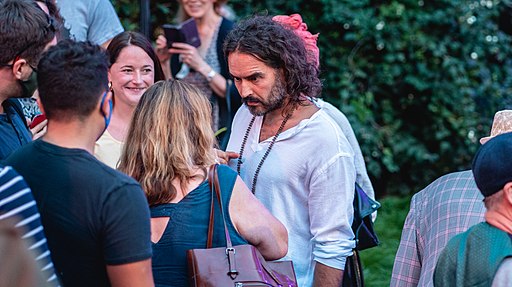
A disclaimer, just to clarify things up front: I have no opinion on the truth or falsehood of allegations — made anonymously by multiple women and reported by multiple UK media outlets — that comedian/podcaster Russell Brand is a serial rapist.
I happen to have disliked Brand during his earlier comedy career (just a matter of personal taste), and to enjoy his current podcast, “Stay Free With Russell Brand.” That is, or at least should be, irrelevant. While I’m subject to the same “where there’s lots of smoke, there’s usually fire” predisposition as most people, I personally try to resist that tendency. I don’t know if he’s guilty. I don’t know if he’s innocent. I’m not going to PRETEND to know.
I do, however, know (or at least believe) a few things about how matters like this should, may, shouldn’t, and must not be handled by various people and organizations.
You and I are, of course, entitled to our own opinions. “Presumption of innocence” is a legal concept applicable to court proceedings, not a prior restraint on our right (assuming we’re not jurors) to believe whatever we want to believe. We should (if we’re interested) pay attention while reaching our conclusions. We may (if we’re lazy), but shouldn’t, decide not to do so and just go with whatever our feelz say. We must not take it upon ourselves to, for example, assault Brand in the street.
Media covering the matter should (but often don’t) do so with care and attention to the facts. They may, but shouldn’t, ignore inconvenient facts to get a more salacious story out of other facts. They must not (at least within the existing legal framework as it relates to libel/defamation) lie about Brand, knowingly or from reckless disregard for the truth.
Media platforms which characterize themselves as “open to the public” should be “open” to Brand. They may, but shouldn’t, choose to ban or “demonetize” members of that public, especially on the basis of as yet unproven allegations, as YouTube has done with Brand. They should, as the Rumble platform has done, respond to government demands that they “deplatform” members of the public with a firm “no, we will not act as censors on your behalf.”
Governments (if we allow them to exist — we shouldn’t, but that’s a different subject) should carefully, and with respect for all the rights of the accused, investigate and adjudicate accusations like those made against Brand. They must not lean on media to slant its coverage of such matters, or on media platforms to ban or “demonetize” those accused of crimes.
That last one is the most important. I’m of the opinion that government agents or agencies which engage in such behavior should be banned and demonetized. People should be fired. Agencies should lose their funding. Governments should be (as peacefully as possible) overthrown.
If Brand is a rapist, he should pay — AFTER that is proven, not before. Either way, he’s not nearly as dangerous as the machine that’s going after him.
Thomas L. Knapp (Twitter: @thomaslknapp) is director and senior news analyst at the William Lloyd Garrison Center for Libertarian Advocacy Journalism (thegarrisoncenter.org). He lives and works in north central Florida.
PUBLICATION/CITATION HISTORY
